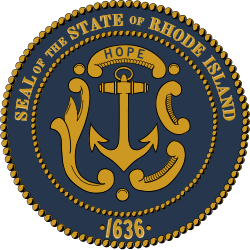| |||||||||||||||||
| |||||||||||||||||
 County results Sprague: 50–60% Smith: 50–60% | |||||||||||||||||
| |||||||||||||||||
| Elections in Rhode Island |
|---|
 |
A gubernatorial election was held in Rhode Island on April 3, 1861. The incumbent Constitutional Union governor William Sprague IV defeated the Republican mayor of Providence James Y. Smith. [1]
Contents
Sprague won the 1860 election leading a coalition of Conservative Republicans, former Whigs, and Democrats that formed to oppose the Radical Republican gubernatorial candidate, Seth Padelford. [2] Following the election, his supporters coalesced in the Constitutional Union Party. [3] In concurrent elections for the United States House of Representatives, the Constitutional Union candidates defeated the Republican candidates in both Rhode Island congressional districts. [4]

